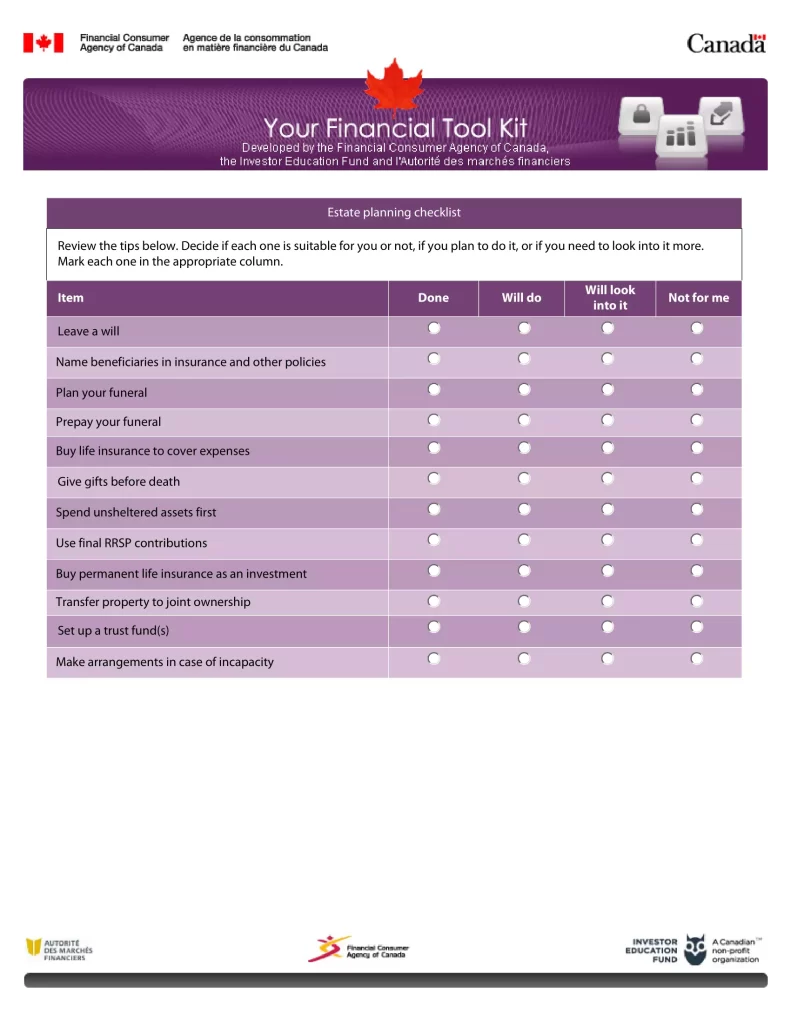Physical and mental decline due to aging are a part of life. Like an up‑to‑date Will, a power of attorney is an important tool in financial and estate planning. Planning ahead in case of serious disability or health problems allows decision‑making relating to property or personal care to proceed without unnecessary disruption.
What is a Power of Attorney?
A Will gives an executor or liquidator the authority to manage someone’s affairs after death. In contrast, a power of attorney gives the person named (referred to as an “attorney,” “donee” or, in Québec, a “mandatary”), the power to make decisions on your behalf while you (the “donor”) are still alive. These decisions can be financial or, where provincial law permits, personal in nature, or both. A power of attorney, like your Will, is an integral part of your overall estate plan.
What is a Power of Attorney for Property?
A power of attorney for property can be either limited or general in nature. With a limited power of attorney, the attorney’s authority may be restricted, such as to sell specific securities or conduct banking activities only during the donor’s absence from the country. Many financial institutions utilize a stock power of attorney when handling share certificates on behalf of a client, which confines the authority to the designated account or shares. In contrast, a general power of attorney grants broad authority over financial matters, except for making or altering the donor’s Will.
Individuals who frequently travel outside the jurisdiction where their assets are located, or who foresee potential incapacity due to age or illness, often opt for a general power of attorney. In jurisdictions where permitted by provincial law, powers of attorney for property can be continuing (or “durable”), remaining effective even if the donor becomes mentally incapable. Without a continuing power of attorney, managing your financial affairs upon incapacity may require your family or friends to undergo a time-consuming and costly legal process to obtain the necessary authority.
It’s crucial to carefully consider when the power of attorney takes effect. It can be effective immediately upon signing or “springing” into effect upon the occurrence of a specific event. For instance, a springing power of attorney activated upon the donor’s mental incapacity might not be operational with a financial institution until proof of incapacity is provided. In such cases, certification from a medical practitioner may be necessary before the named attorney can act on behalf of the donor. This requirement could inadvertently delay property decisions and may entail additional costs associated with obtaining medical certification.
What is a Power of Attorney for Personal Care?
In those jurisdictions where it’s recognized, a power of attorney for personal care ensures that someone is authorized and prepared to make decisions of a personal nature on your behalf, should you become incapacitated. Unlike a power of attorney for property that may by its terms be effective both before and after incapacity, this power of attorney comes into effect only on your incapacity. You can appoint as your attorney for personal care the same person as your attorney for property, or you may name someone else. Depending on the province you live in, decisions about where you would live, what you would eat, or medical treatment you would receive would be the responsibility of your attorney for personal care. In some provinces, you can appoint a substitute decision‑maker only for medical decisions. Some provinces, such as British Columbia and New Brunswick, allow you to combine your power of attorney for property with a power of attorney for personal care.
Whom Should I Choose to be My Attorney?
The term “attorney” denotes a decision-maker, distinct from “attorney-at-law,” which refers to a lawyer in certain jurisdictions, notably in the United States. Many individuals designate a spouse, adult child, or someone close to them as their attorney. Attorneys must comprehend their responsibilities and be capable of managing the affairs for which they may assume responsibility. It’s crucial to carefully consider who will oversee your assets and well-being. Your attorney should be someone you trust implicitly, knowing they will act in your best interests. While it’s possible to appoint more than one attorney, it’s essential to specify whether they must act jointly, by majority rule, or independently.
If feasible, it’s advisable to appoint an attorney for property with financial acumen or who knows when to seek professional assistance. Alternatively, naming a professional trust company as attorney for property can be advantageous, especially since the attorney’s role extends throughout the incapacitated person’s lifetime. It’s prudent to discuss the responsibilities with the prospective appointee to ensure they are capable and willing to assume this role. Additionally, it’s important to address compensation jointly and incorporate this understanding into the power of attorney document.
Granting power of attorney to someone does not strip you of your personal authority (unless the document contains limitations related to your mental state). However, it may authorize the attorney to share that authority concurrently with you concerning property matters, though not for medical care, as the power of attorney only takes effect upon your incapacity.
What Does a Power of Attorney Document Look Like?
The forms for power of attorney are designed according to the applicable provincial legislation. All documents include:
- The name of the donor
- The name of the attorney
- The specific authority being given
- The witnessed signature of the donor
As with a Will, the donor must be mentally competent, or “of sound mind” according to the criteria set out in provincial statutes when the power of attorney is signed. A person whose mental faculties are failing must have chosen an attorney to act on his or her behalf and have executed a power of attorney while still competent. Otherwise the person will not be able to choose who will act.
Are there Alternatives to Powers of Attorney for Property?
Joint interests with the right of survivorship, though not recognized in Quebec, can be established for bank and/or investment accounts held jointly with your spouse or another trusted individual. Such joint accounts, set up to allow either party to sign or complete transactions, can diminish the necessity for a power of attorney. However, this doesn’t negate the importance of having a general power of attorney for property; rather, joint ownership can complement the prudent use of powers of attorney.
If you own real estate individually or jointly, it’s essential to consider granting your partner power of attorney to facilitate transactions in case of incapacity. Depending on your ages and health, it might be advisable for both of you to appoint a third party with power of attorney to manage your affairs if mental incapacity arises.
Alternatively, you can opt for a revocable inter vivos trust instead of a power of attorney. This type of trust, established during your lifetime, allows you to retain the power to terminate the trust and reclaim the property. Some individuals, especially elderly ones or those anticipating incapacity, choose this option when they no longer wish to manage their assets personally. Unlike a power of attorney, transferring assets to a revocable inter vivos trust involves relinquishing title to those assets (until the trust is revoked). It’s crucial to discuss the tax implications of this alternative with a legal advisor.
Conclusion
A power of attorney is only one aspect of a comprehensive estate plan. Legislation is continually changing, so a review of your powers of attorney and your will are strongly recommended. You should consult a lawyer in your province or territory before executing any of these documents.




